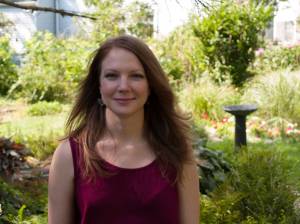 Claire Eder is a poet and translator living in Athens, Ohio, where she is a PhD student in poetry at Ohio University. Originally from Ann Arbor, Michigan, she completed her MFA in poetry at the University of Florida. Her translations of contemporary French poetry have appeared or are forthcoming in Subtropics, Guernica, and The Common. She serves as an editor of Quarter After Eight literary magazine.
Claire Eder is a poet and translator living in Athens, Ohio, where she is a PhD student in poetry at Ohio University. Originally from Ann Arbor, Michigan, she completed her MFA in poetry at the University of Florida. Her translations of contemporary French poetry have appeared or are forthcoming in Subtropics, Guernica, and The Common. She serves as an editor of Quarter After Eight literary magazine.
Having studied French since middle school, Claire became further immersed in the language during her studies at Kalamazoo College. In her junior year, she studied abroad in Clermont-Ferrand, France, where she took courses in language, literature, and culture. She also got her first taste of translation: she helped a local pianist with the English version of the booklet for his new CD. The experience of living for six months in the language that she had studied—at a distance—for so many years inspired a senior thesis project in which she attempted to translate her own English-language poems into French. This project proved nearly impossible but chaotically fertile, with poems bubbling up in both languages and cross-fertilizing, and at its completion Claire was awarded her college’s prize for an outstanding undergraduate thesis.
Claire began to translate contemporary French poetry during her MFA at the University of Florida, where she had the privilege of studying with accomplished and generous translators Sidney Wade and Michael Hofmann. She also collaborated long-distance with mentors she had met in Clermont-Ferrand, Joelle Caron and Mélissa Fox-Muraton, on translations of Christian Prigent’s poem series Le Voyage d’Italie. In the attempt to recreate Prigent’s relentless sound play and gleeful vulgarity in English, Claire began to recognize translation as a creative challenge, a mode of deep literary study, and a means of connection to other cultures, writers, and readers.
Claire is currently at work translating the book-length collections Opéra des limites by Marie-Claire Bancquart and Iris, c’est votre bleu by Ariane Dreyfus. She was drawn to Bancquart by the poet’s intensity of image and her mystical, erotic approach to one of her most common subjects: death. In contrast, Dreyfus’s eroticism is that of the living, and her personal poems reflect on love, art, the self, and human rights. Her language is vernacular, lively, and intimate. Claire’s work with these poets reflects a commitment to women’s voices, which she sees as especially important given the underrepresentation of women poets in anthologies and other publications of contemporary French poetry. She is looking forward to sharing the work of these poets, and to learning about other writers from around the world, at the 2015 ALTA conference.
